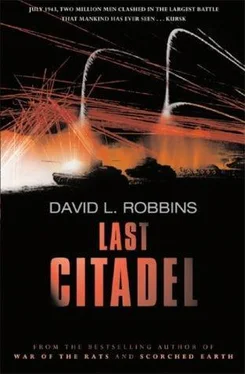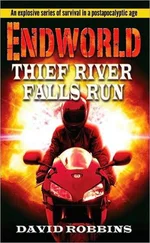He headed south toward the Brandenburg Gate and Unter den Linden. He decided he would not seek shelter during the raid but would walk home through the open spaces of the Tiergarten. He wasn’t afraid to do this, and knew in a familiar place inside that he ought to be. Breit considered his new self, and hoped courage would not also make him stupid.
Just over the river Berliners were drawn out of their buildings by the sirens and into the streets and alleys, then down into the warrens under the city, the shelters and subway tunnels where they were ordered to go when the alarm sounded. Only uniformed soldiers were allowed out during a raid, everyone else was required to be in a shelter or risk arrest. The people, mostly women and elderly, were orderly, even bland, carting babies and food baskets. Hitler and Goebbels bleated constantly about the bravery of the homefront, how Germans would not succumb to these Anglo assaults. Breit noted some weeping among the people flowing by. That’s fine, he thought, you can still cry and be brave. I have done it recently.
After ten minutes walking with the howling horns, the first searchlights came on. Nothing showed at the far tips of their pillars. The drone of British Mosquito bombers vibrated over Berlin like metal clouds coming to shower bolts and nuts. It was an eerie noise, rattling out of the night like that, invisible, it struck Breit’s memory of the partisans, who, too, worked in the night. There was something unfair about this type of fighting, also something terrifying and effective, coming and going when right people should be finishing dinner, readying for bed. As if war were not terrible enough, Breit thought, it is also the ultimate inconvenience.
He reached the Brandenburg Gate and passed under it. He crossed the wide boulevard and entered the great park in the heart of Berlin. His rib cage and legs complained when he stumbled over a curb, not watching where he walked, his head tilted up to the crossing searchlights. The streets were almost empty now, bearing only the hee-haws of ambulances and fire trucks scrambling into position throughout the city. The Tiergarten was unlit except for the beams. The lights swept to and fro, making the shadows of the trees in the park sway and crawl over the ground, making the whole park teeter. Breit hobbled to a broad plat of grass and sat.
The first bombers buzzed over the city The evening was clear, searchlights rid the sky of stars. A dozen planes in the first echelon took the stars’ places, snared in the beams; the lights stopped their dizzying reel whenever they snared the trophy of a bomber. Breit stared up and saw these planes drop not bombs but flares, green sizzling signals for the ones behind to mark where they should drop their loads. The British did not bomb only factories and military targets. Hitler did not do so when he visited the skies over London, so this was fair, Breit decided, an ugly tit for tat. The flares drifted down on little chutes into the city’s center, over the Adlon Hotel, the burned-out Reichstag, Hitler’s Chancellery, the dense streets of offices and neighborhoods, and the Tiergarten. It was odd watching their slow fall, the invasion of bad tidings with a touch of sparkles, like holiday lights. Several flares landed in the park around Breit but he did not move to put them out.
Anti-aircraft stations opened up, punching at the Anglo bombers seen and unseen. There were many 88 mm gun emplacements throughout the city. Cannons stood on top of buildings like the IG Farben headquarters in Pariserplatz, there was one at the Red-White Tennis Club. The inner-city’s air defense was principally handled by three huge flak towers with eight big guns each. The towers were designed by Albert Speer, built in 1941: at the Zoological Gardens behind the bear cages, in Humbolthain Park, and in Friederichshain Park. These were massive fortresses, intended by Speer to inspire faith among Berliners. They were gun batteries, as well as bunkers and communications towers, but also castles, almost medieval, meant to be the first of the new buildings for Germania, Hitler’s city of the future that would replace Berlin after the war. Breit listened to the three giant bastions open up, heard the woof of smaller guns around the city. Beneath the guns and the sirens was the piping of tumbling British bombs.
The initial barrages landed south of the park, on Wilmersdorf and Shoneberg, residential districts. The first bombs were incendiary, meant to start fires to light the way better for the waves of bombers following, the ones with the big payloads. Berlin was to be handed the butcher’s bill tonight for the Reich’s failure in Russia. The British wagged a finger in Hitler’s face. More fire bombs landed around the city, north and east of Breit, in Mitte over the administrative offices of the Reich, along the river Spree, perhaps on the hospital Breit had just left. The city tried to make itself dark, blast curtains hung over every window, every light was doused, even those of the emergency vehicles running crazy in the erupting streets, but the fire bombs did their work. Berlin burned for them, accommodating the bombers with wooden roofs, kindled ancient spires and domes, blown-open gas lines, flaming cars and trucks, scorching grass. An ignited wind crossed Breit’s nostrils, the smells of carbon and fuel. He wrapped his knees in his arms, the instinct was to be small.
Once the city was on fire, the British drone above swelled. Ranks of bombers powered into range, the searchlights went wild with them. The sound was apocalyptic, Breit had never heard anything like this. The sky, as immense as it had been in Russia, seemed even larger this night over Germany, venting the noise of what must have been a thousand bombers. Then came the whistles.
Breit steeled himself, waiting, staring into the trilling night. The searchlights flashed left and right until they caught sight of the falling bombs. The things rushed down through the beams, packed so thick as to be preposterous, they were no more than small gray points in the searchlights but looked like a bed of nails descending on the city. Then the first burst of them landed.
Breit gasped. The explosions raised fireballs in the city. The flames that had come first danced a sort of glee, like demons welcoming the greater members of their kind to the ground. He watched the entire city under onslaught, a carpet of carnage in every direction. Buildings disappeared in great spouts of blaze and concussion. Places Breit knew, that he could erect in his mind from memory, were scythed to their foundations under the bombs, hammered into shards of stone, broken brick and melted glass, scored timbers. Bombs fell, too, in the Tiergarten. The closest landed a hundred meters from him. Trees became torches, the soil trembled under him. Anti-aircraft batteries emptied themselves straight up at the English, adding their own sharp bits to the night. He made no move to go. He studied the bombardment, every part of it. He listened to the many peals of the attack; soon, the bombs, guns, and sirens blended into one long and unremitting rumble, like a bolt of lightning that would not end.
With every explosion, Breit adjusted his image of Berlin. He blacked out structures and destroyed whole blocks on his mental map table, reshaping the city with the bombs. By dawn Berlin would be changed; how much depended on the firefighters and luck. Breit tried to regard the bombs as allies; wasn’t this attack on civilians something for him to cheer for? But just as he was unable to appreciate the Red partisans – they were brutes to him – these English bombs were horrors. That was the lesson tonight. Everything in war, even destruction and killing that serves your own ends, is horrible.
In an hour, the British were spent. They flew away, and the guns firing up at them silenced. Breit could not tell how many planes there had been, or how many of them had been shot down. No matter. The German city they left behind crackled and simmered under a rising, flickering haze. The raid was English vengeance. Breit listened to them fade away west. The British are a cold people when angry, he thought. Not like the Russians, so hot to spill blood. And we Germans, what are we? We’re the worst. We believe war is glorious.
Читать дальше












